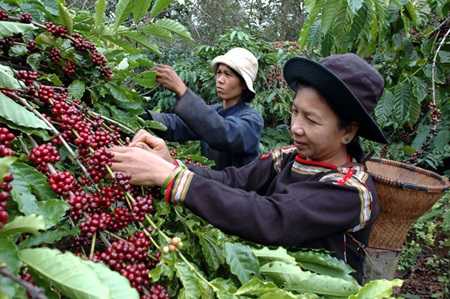DAK LAK, Vietnam – Vietnamese coffee companies are trying to export processed products instead of raw materials, while in the domestic market, they are attempting to change consumer habits with the message ‘clean coffee’.
After deciding to spend VND1 trillion to develop hi-tech agriculture in Dak Lak province last week, NutiFood also made the strategic investment in Phuoc An coffee company.
The move showed that NutiFood follows an ambitious plan to diversify its products in the food & beverage (F&B) sector.
With the investment, Dak Lak will be able to organize coffee production from seedlings, plantation, and harvesting to processing and product development.
With annual revenue of VND300 billion, Phuoc A now mostly exports raw coffee. However, the company has a large 830 hectare material growing area and is managing 1,400 hectares of UTZ certified coffee which are great advantages.
The basalt soil belonging to CADA Plantation put under Phuoc An’s management, built by the French in 1922, is famous for the high quality of coffee.
NutiFood said it will set up a processing plant, a part of the plan to build a coffee brand with Buon Ma Thuot geographical indication. The products will be sold in the domestic market and for export, including the US and Japan.
Meanwhile, TNI Corporation puts high hopes on the Chinese market. Le Hoang Diep Thao, the founder of King Coffee in the US in 2016, opened a plant last month which has the capacity of 9,000 tons of roasted coffee and 19,800 tons of instant coffee. China’s coffee volume is increasing very rapidly.
In the past, the domestic coffee market was dominated by several names such as Trung Nguyen, Nestcafe and Vinacafe. But now, there are many coffee brands which compete in different market segments, from roasted coffee and instant coffee to fresh coffee.
Coffee companies seem to have realized that Vietnam, with 90 million people, is a market that can bring turnover far exceeding export turnover.
Supposed that only 10 percent of the population drink coffee and each of them drink one cup of coffee, priced at VND20,000, the daily turnover would be VND200 billion, or $3.5 billion a year.
The high domestic demand explains why Vietnam, while a big coffee exporter, still imports processed coffee in large quantity. The imports are 2-3 times more expensive than domestic products.
Phan Minh Thong, chair of Phuc Sinh, said once the coffee bean export market gets saturated and the profit from coffee export decreases, focusing on the home market would be inevitable.
Thanh Lich


















